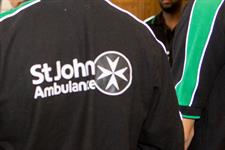St John Ambulance might have to make about 250 redundancies as it attempts to tackle expected losses of more than £45m over the next two years.
A statement from the charity, which has almost 1,600 employees, said it needed to substantially reduce costs now that major sources of income had dried up in recent months because of the coronavirus outbreak.
It expects to record a deficit of £25m in 2020 and a further loss of £21m next year.
The majority of any redundancies are expected to come in the charity’s training organisation.
A consultation with staff has begun, but it is not expected that any redundancies will be made before the autumn.
Martin Houghton-Brown, chief executive of the charity, told MPs on the Digital, Culture, Media & Sport Select Committee at the end of March that the SJA would need “heavy borrowing” from August if the pandemic continued into the summer.
The charity had £13.6m in reserves at the end of 2018, according to its most recent accounts, with an income of £98m and spending of £102m.
The charity’s latest statement, from Houghton-Brown, said: “St John Ambulance is playing an important role in supporting hospitals and ambulance services with the national fight against Covid-19.
“However, we are a charity and have seen major sources of income dry up over recent months.
“This means that we need to reduce costs substantially, which might see around 250 roles being made redundant in order to secure our survival and continue serving communities in future.”
St John Ambulance is expected to receive funds from the government’s £750m emergency fund announced in April, but the amount that it will receive has not yet been made public.
Houghton-Brown said the charity was also using the Coronavirus Job Retention Scheme, but it was “clear that we need to act sooner rather than later to protect our charity”.
He said: “We are consulting our employees and engaging with them in the process of finding the most appropriate solutions to reducing our costs.
“We want to ensure that those affected are dealt with fairly and transparently, and will seek to minimise the impact of this as much as we can.”
